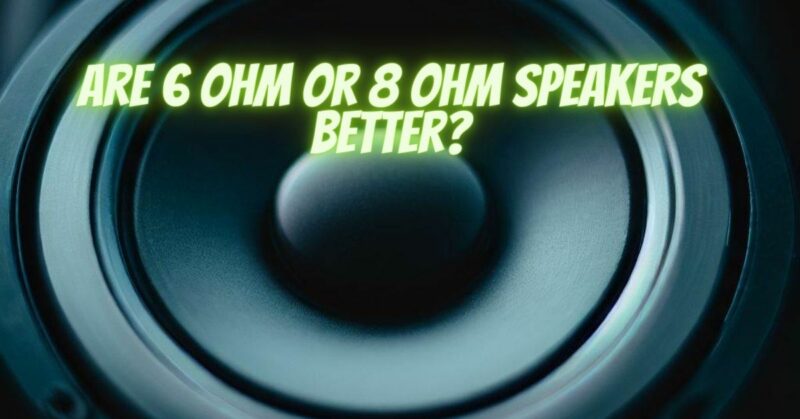Speaker ohms are a measure of the electrical resistance of a speaker. The lower the ohms, the less resistance the speaker has, and the more current it can draw from the amplifier. This can result in louder volume and better bass response. However, it is important to note that not all amplifiers are compatible with all speaker ohms.
6 ohm speakers
6 ohm speakers are typically more efficient than 8 ohm speakers, meaning that they can produce more sound with less power. This can be a good option for guitarists who play at low volumes or who have an amplifier with limited power output. However, 6 ohm speakers can also draw more current from the amplifier, which can put more stress on the amplifier and shorten its lifespan.
8 ohm speakers
8 ohm speakers are less efficient than 6 ohm speakers, but they are also less demanding on the amplifier. This can be a good option for guitarists who play at high volumes or who have an amplifier with limited headroom. 8 ohm speakers are also less likely to cause the amplifier to overheat.
Which type of speaker is better for you?
The best type of speaker for you depends on your individual needs and preferences. If you are looking for a speaker that is efficient and can produce loud volume, then a 6 ohm speaker may be a good option for you. However, if you are looking for a speaker that is less demanding on the amplifier and less likely to overheat, then an 8 ohm speaker may be a better choice.
Here are some additional factors to consider when choosing between 6 ohm and 8 ohm speakers:
- Musical style: If you play a lot of heavy metal or other genres that require a lot of bass, then a 6 ohm speaker may be a better choice for you. This is because 6 ohm speakers can handle more power and produce better bass response.
- Personal preference: Ultimately, the best way to decide which type of speaker is right for you is to try out different models and see which one you like the best.
Speaker impedance and amplifier compatibility
It is important to note that not all amplifiers are compatible with all speaker ohms. If you are not sure what speaker ohms your amplifier can handle, consult your amplifier’s manual.
Some amplifiers are only compatible with 8 ohm speakers, while others can handle 4 ohm, 6 ohm, and 8 ohm speakers. It is important to make sure that the speakers you choose are compatible with your amplifier to avoid damaging your equipment.
Speaker impedance and sound quality
Speaker impedance can also have an impact on sound quality. 6 ohm speakers are typically more efficient than 8 ohm speakers, meaning that they can produce more sound with less power. This can lead to a brighter, more aggressive sound.
8 ohm speakers, on the other hand, are less efficient than 6 ohm speakers, but they can produce a more natural, well-balanced sound.
There is no definitive answer to the question of whether 6 ohm speakers or 8 ohm speakers are superior. Both types of speakers have their own advantages and disadvantages. The best type of speaker for you depends on your individual needs and preferences. Consider the factors listed above when making your decision, and try out different models before you buy one. With a little research, you can find the perfect speaker to help you create the music you love.
Additional tips for choosing speakers
Here are some additional tips for choosing speakers:
- Consider the size of the room where you will be using the speakers. If you are playing in a small room, you may not need large speakers.
- Consider the type of music you play. If you play a lot of bass-heavy music, you will need speakers that can handle a lot of bass.
- Consider your budget. Speakers can range in price from a few dollars to several thousand dollars. Set a budget before you start shopping so that you don’t overspend.
Once you have considered all of these factors, you will be well on your way to choosing the right speakers for your needs.


